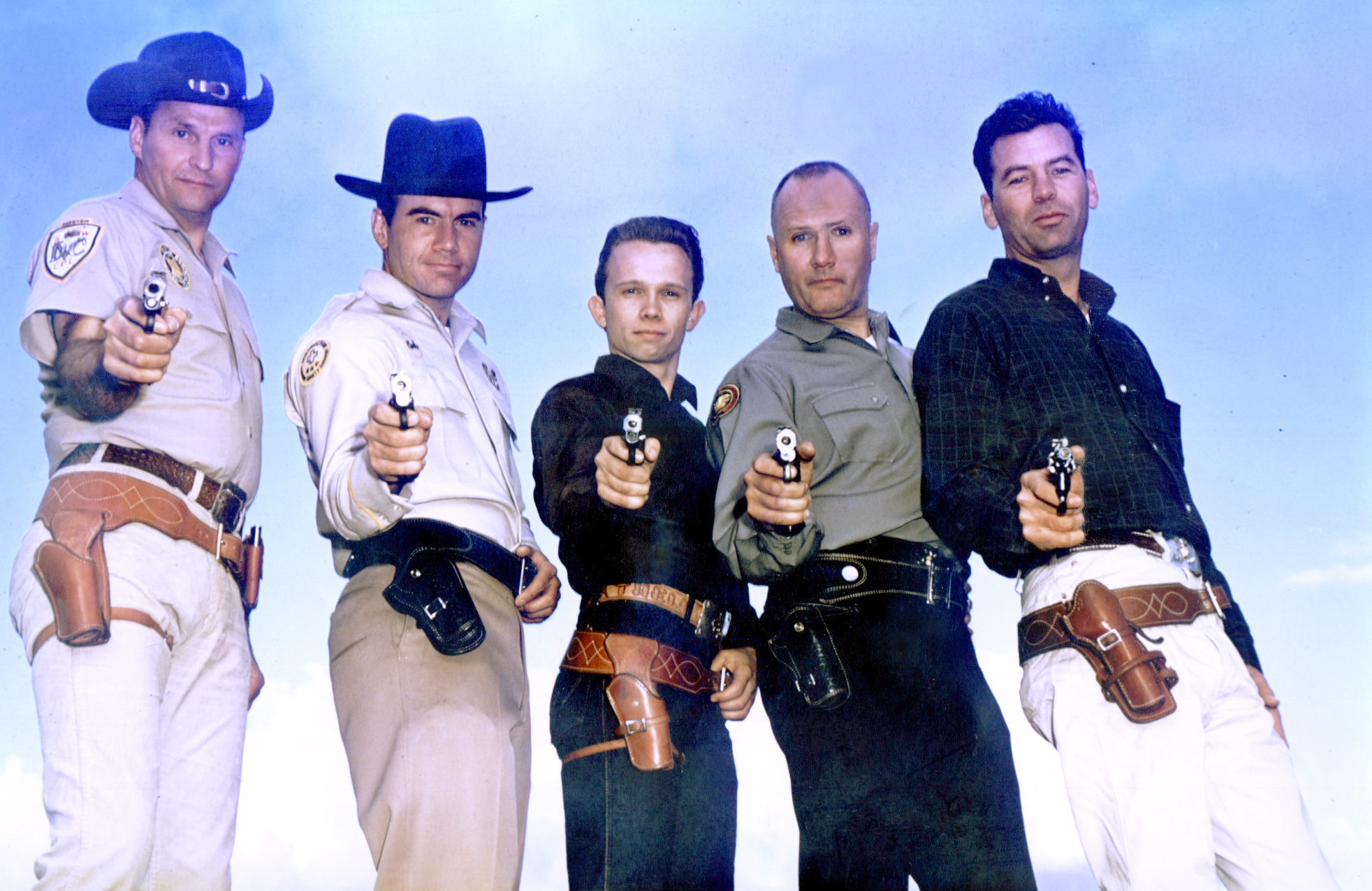Five of the most famous shooters from the beginning of practical shooting in California during the late 1950s. Left to right: Ray Chapman, Elden Carl, Thell Reed, Jeff Cooper and Jack Weaver. (The sixth “Combat Master”, John Plahn, is missing from this photograph.) Public Domain.
We live in a world where threats can emerge without warning. The ability to defend oneself is not just a necessary skill, it’s a mindset. Jeff Cooper, a legendary figure in the firearms and self-defense community, distilled the essence of personal protection into seven timeless principles. These principles, outlined in his seminal work Principles of Personal Defense, are not just tactical guidelines, they are psychological and philosophical foundations for anyone serious about surviving violent encounters.
Let’s walk through each of Cooper’s seven principles and explore how they can empower you to take control of your personal safety in today’s unpredictable world, demonstrating their timeless relevance even decades after their introduction.
1. Alertness
“The first principle of personal defense is alertness.”
Cooper emphasized that awareness is the cornerstone of survival, noting that most attacks are preceded by warning signs such as suspicious behavior, unusual movements, or environmental cues. The ability to detect these early can mean the difference between evasion and victimization.
• Situational awareness: Always know who is around you, what they’re doing, and what potential threats exist.
• Avoid complacency: Danger often strikes when people are distracted or overly comfortable.
• Practice observation: Train yourself to notice details—license plates, clothing, body language.
Modern applications include avoiding distractions like smartphones in public, scanning environments when entering new spaces, and trusting your instincts when something feels off.
2. Decisiveness
“A decisive man is a dangerous man.”
Once a threat is identified, hesitation can be fatal. Cooper argued that the defender must act with clarity and resolve. Whether the decision is to flee, confront, or use force, it must be made swiftly and executed without ambiguity.
• Commit to action: Don’t second-guess yourself in a crisis.
• Train for decision-making: Simulate scenarios to build confidence in your responses.
• Avoid paralysis: Fear and uncertainty can freeze you. Mental preparation breaks that cycle.
Decisiveness is not recklessness. It’s informed, practiced, and deliberate action under pressure.
3. Aggressiveness
“The best defense is a good offense.”
Cooper’s third principle challenges the notion of passive defense. He believed that once a violent encounter begins, the defender must become the aggressor, overwhelming the attacker with force and resolve,
• Dominate the encounter: Use surprise, speed, and intensity to take control.
• Channel controlled aggression: It’s not about rage, it’s about focused, purposeful energy.
• Break the attacker’s will: Make them regret choosing you as a target.
Aggressiveness doesn’t mean initiating violence/ It means responding to violence with enough force to neutralize the threat.
4. Speed
“Speed is the essence of war.”
In a confrontation, speed can be your greatest ally. Cooper emphasized that rapid response, whether drawing a weapon, escaping, or striking, can disrupt an attacker’s plan and shift the balance of power.
• Train for speed: Practice movements until they become reflexive.
• Eliminate wasted motion: Efficiency is key in high-stress situations.
• React faster than your opponent: Surprise and tempo can overwhelm even stronger adversaries.
Speed is not just physical, it’s mental. Quick thinking and rapid decision-making are equally vital.
5. Coolness
“Keep your head.”
Panic is the enemy of effectiveness. Cooper believed that maintaining composure under pressure is essential. A calm mind can assess threats, choose the best response, and execute it with precision.
• Control adrenaline: Breathing techniques and mental conditioning help.
• Stay emotionally detached: Focus on the task, not the fear.
• Practice under stress: Simulated drills build psychological resilience.
Coolness is the ability to function effectively in chaos. It’s the trait that separates survivors from victims.
6. Ruthlessness
“Be ruthless in your defense.”
This principle often sparks debate, but Cooper’s intent was clear: when defending your life, there is no room for half-measures. Ruthlessness means doing whatever is necessary to stop the threat without hesitation or mercy.
• Prioritize survival: Your safety comes before the attacker’s well-being.
• Use overwhelming force: End the threat decisively.
• Don’t hold back: In life-or-death situations, restraint can be lethal.
Ruthlessness isn’t cruelty, it’s the refusal to be victimized. It’s the mindset that says, “I will not lose.”
7. Surprise
“Strike when least expected.”
The final principle is strategic: use the element of surprise to your advantage. Cooper noted that attackers often expect compliance or fear. When met with unexpected resistance, they falter.
• Be unpredictable: Don’t telegraph your intentions.
• Use deception: Feign weakness, then strike.
• Exploit timing: Act when the attacker is distracted or vulnerable.
Surprise can turn the tide of an encounter. It’s a force multiplier that can compensate for physical disadvantage.
Final Thoughts
Jeff Cooper’s Principles of Personal Defense are more than tactical advice, they’re a philosophy of survival. They teach that self-defense begins long before an attack and continues until the threat is neutralized. These principles demand mental preparation, physical training, and a commitment to personal responsibility.
In today’s unpredictable world, Cooper’s insights remain profoundly relevant. Whether you carry a weapon or rely on unarmed techniques, these principles can guide your mindset and actions. They remind us that defense is not just about tools. It’s about attitude, awareness, and the will to prevail.
